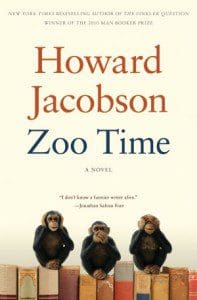 Guy Ableman fixates on Amazon.com the way that he fixates on the runaway success of “The Girl Who Ate Her Own Placenta,” or on his mother-in-law, or his wife, or monkeys – with a gleeful sort of disgust. The protagonist, if you can call him that, of Howard Jacobson’s new novel, Zoo Time (Bloomsbury, 376 pages), is nothing short of feral. “Feral!,” Guy exclaims upon described as such. “From the Latin for an unruly beast. Guy Feral. Feral Guy.”
Guy Ableman fixates on Amazon.com the way that he fixates on the runaway success of “The Girl Who Ate Her Own Placenta,” or on his mother-in-law, or his wife, or monkeys – with a gleeful sort of disgust. The protagonist, if you can call him that, of Howard Jacobson’s new novel, Zoo Time (Bloomsbury, 376 pages), is nothing short of feral. “Feral!,” Guy exclaims upon described as such. “From the Latin for an unruly beast. Guy Feral. Feral Guy.”
These, however, are feral times. The publishing industry has, in Guy’s view, dissolved and reconstituted itself into a gelatinous mass of insipid children’s literature, vampire-studded bodice-rippers, absurd online reviews, “Twitting,” and “blagging.” Physical books languish outside the timid, tepid minds of the populace, replaced by 140-character updates and digitized fluff. “Readers had changed,” Guy thinks. “Expectations of the book had changed. In a word, there were none.”
It is within this turbulent, meaningless time that Guy and Jacobson’s frustrated minds flourish. Both narrator and author feed on the copious material that a voluptuously commercialized publishing world offers. Over a light lunch, the new female head of Guy’s publishing house, while wearing a “sort of weightlifter’s singlet,” banishes him into obscurity. And Guy’s agent commits suicide within hours of speaking to his client about his prospects. Little is safe from Jacobson’s harpoon. The sly little smile of a Larry David in mid-joke underscores all of Zoo Time.
Jacobson’s central theme, though, is not that the publishing industry has gone to Hell in a feral handbasket, but that all of humanity seems to have become a zoo. Guy lusts insatiably after Poppy, his mother-in-law, who is “as tall as a pergola, as slender as a downpipe, yet high-breasted, as vivacious as an apple orchard in a tornado.” When they finally kiss, Guy, who happens to have one foot on a tarantula, sends both spider and woman toward an unhappy end. “There are moments,” writes Jacobson, “of trembling collusion in the lives of men and women, when the sacred rules governing decent society reassert themselves only to be broken. Right shows its face for the final time, in order that we can relish wrong. Zoo time.”
Relishing wrong is precisely what seems to sustain Jacobson, who won the Man Booker Prize for his novel “The Finkler Question,” and nourish his wit. Zoo Time sees Guy wickedly tinkering, ape-like, not just with the publishing world, but with his more immediate domestic life.
“We ate dinner at wooden tables looking out into Shark Bay. The air was warm and silky. The sea barely moved. ‘It smells like baby out here,’ I said.
“’Like a baby?’
“’No, not like a baby. Like baby. The essence of newborn baby that you get when you smell its head.’
“’Christ, I hope you’re not thinking of writing that down.’ I was, but didn’t dare to now.
“’I’ll tell you what I can smell,’ Vanessa said. ‘Dolphin.’
“’What does dolphin smell like?’
“’Breathe in. Can you smell it now?’
“’Yes,’ I lied. In fact, what Vanessa could smell was the barbequed barracuda at the next couple’s table. Unless it was their baby.
It’s impossible to ignore Jacobson’s presence behind Guy, their parallel authorial paths and fixations on the lewd, the raucous, the wicked. In fact, writes Guy, or maybe Jacobson, “I know when a writer’s in trouble. When he resorts to writing. And do you want me to tell you how a man knows he’s in trouble as a man?…When he starts feeling up his mother-in-law. In my case the two are not unrelated.”
If Jacobson’s “zoo time” means a final abandonment of societal reason and expectations, then the publishing industry is his monkeyhouse. Jacobson stands there gleefully, with a pocketful of bananas.

2 thoughts on “A Publishing World Gone Beastly: Howard Jacobson’s ‘Zoo Time’”